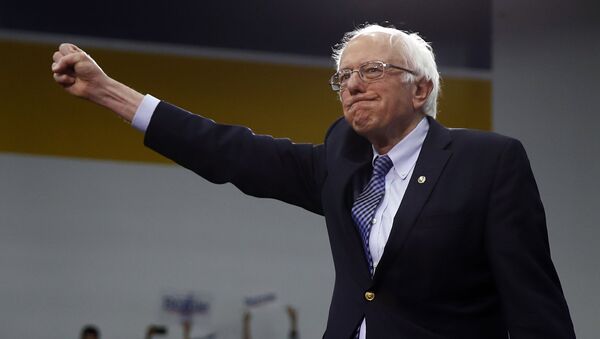With the Iowa caucuses and New Hampshire primary in the rear window, Senator Bernie Sanders, who won the popular vote by a clear margin in both the first and second rounds in Iowa and a narrow victory in New Hampshire, is shaping up as the new Democratic front-runner, commanding attention from investors as they analyse how the stock market might fare if the Vermont senator were elected president, taking into consideration his socialist bent.

His popularity is surging, as evidenced by a new national Washington Post-ABC News poll, which shows him leading by a huge margin, and strategists claim that markets are starting to display a growing undercurrent that a showdown in autumn between Bernie Sanders and “market-friendly” President Donald Trump could be potentially detrimental for stock prices.
#Elections2020: New Washington Post-ABC News national Democratic primary presidential poll: (1/2)
— Jennifer Franco (@jennfranconews) February 19, 2020
•Sanders 32% (+9)
•Biden 16% (-16)
•Bloomberg 14% (+6)
•Warren 12% (unchanged)
•Buttigieg 8%
•Klobuchar 7%
(1,066 adults surveyed, MOE +\- 3.5%)
Although the market’s strong run-up in 2020 evidences that investors are not yet exiting stocks over fears that Bernie Sanders might enter the Oval Office, the self-described socialist senator’s continued strong showing in debates and polls has generated concerns that Sanders’ surge is holding back market potential, claims UBS global investment strategist Jason Draho.
Speaking on Yahoo Finance’s The First Trade, the strategist said:
“There is definitely a kind of fear [among clients] if you get a candidate like Sanders or say Elizabeth Warren… It’s more of a headwind that keeps markets from rising higher.”
What Could Happen if Sanders is President
Market strategists have been sounding the alarm bell on Sanders, since the Vermont senator is perceived by most on Wall Street as “anti-big business, anti-stock market and anti-wealth creation”, and as such – ill-fitted for risk-taking in numerous asset classes, with the exception of gold and bitcoin.
A US presidential victory by the Vermont senator is potentially fraught with the possibility of higher corporate taxes being levied to cover the costs of his Medicare for All, single-payer, national health insurance programme and other social safety net plans, greater regulation around stock buybacks and corporate governance, believe strategists.
Concerns are also fuelled by speculations that a Sanders victory might result in the appointment of Elizabeth Warren as Treasury Secretary.
The US Senator from Massachusetts, who has been running for president of the United States as a Democratic candidate, is known for her list of policy plans that include creating a wealth tax, breaking up big technology companies, and rolling out proposals to transition to a “Medicare-for-all” system.
Billionaire investor Leon Cooperman, founder of Omega Advisors, a frequent critic of Bernie Sanders and Elizabeth Warren over the past year, claimed investors should be more worried about the long-term implications of a Bernie Sanders presidency for the stock market than about the coronavirus.
“I look at Bernie Sanders as a bigger threat [to the stock market] than the coronavirus,” Cooperman told CNBC’s Scott Wapner on the “Halftime Report”.
“I don’t have any insight into the coronavirus, but I assume, with all the great minds of the world focused on this problem, that in three or four months this will become resolved,” said Cooperman.
In late January, as investors were weighing which contenders might be better or worse for stock markets, some of the risks were highlighted during DoubleLine Capital CEO Jeffrey Gundlach’s inaugural Round Table Prime.
As Gundlach admitted, he believed there will be “a moment where the market has to try on the idea of Bernie for real,” he added:
“But Bernie, I believe, is stronger than people think, and [the] market is going to have to deal with that.”
Speaking in an interview on CNBC, on the sidelines of the Goldman Sachs Financial Services conference in New York City on 21 January, Howard Marks, co-founder of Oaktree Capital Management, said Donald Trump’s pro-business stance has made him an attractive president for financial markets.
“The market took off after Trump’s election because he was judged to be pro-market and he has behaved pro-business. So, if he is re-elected people will continue to see him as pro-business. They’ll breathe a sigh of relief that he was re-elected and that will probably be healthy for the market.”



